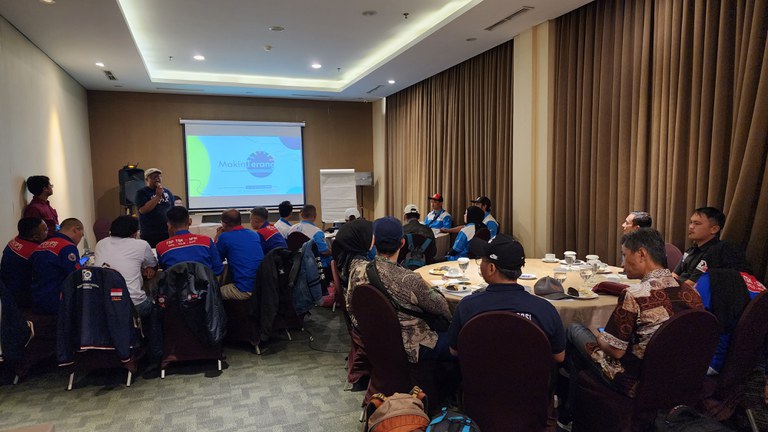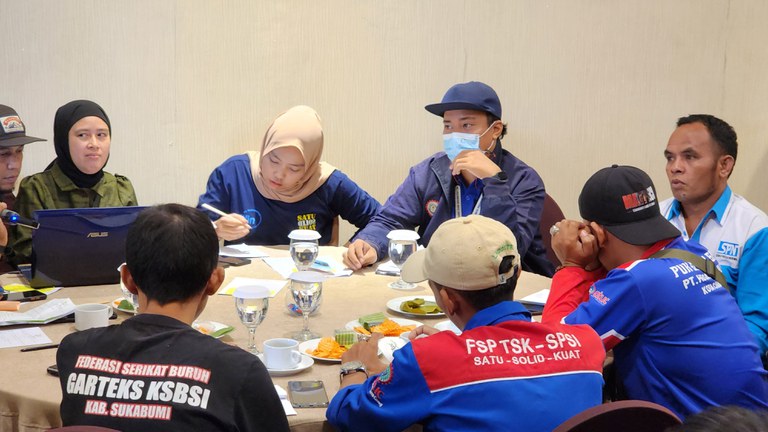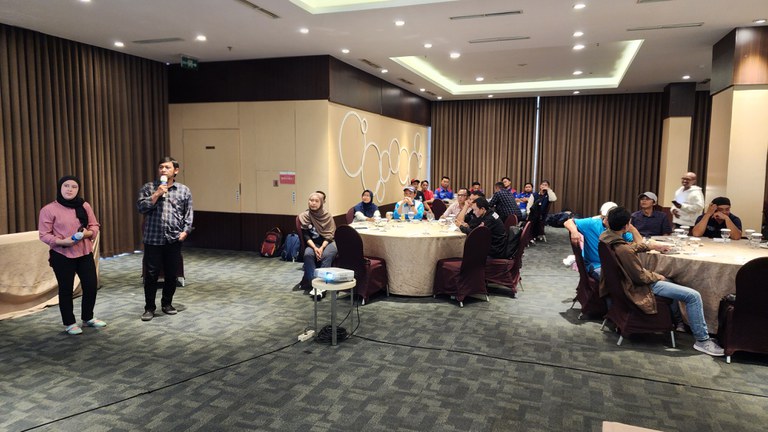Gender-Responsive Collective Bargaining Agreements Workshop
Bandung, December 8-10, 2023
The Makin Terang team made its way to the vibrant city of Bandung from December 8 to 10, 2023, to conduct a Workshop on Gender-Responsive Collective Bargaining Agreements (CBA). Thirty representatives from Trade Unions representing 16 Textile, Garment, Footwear, and Leather Goods (TGSL) factories in West Java and surrounding areas attended with one goal in mind: to improve their capacity in negotiating CBAs, prepare improved draft proposals beyond normative rules, and adopt a gender perspective.
DAY ONE, December 8, 2023
Andina from Gajimu started the workshop by introducing the Makin Terang programme, an initiative to improve work and worker representation in Indonesia. The team achieves this through data collection, training, data-driven collective negotiations, and worker-based monitoring. Participant and facilitator introductions, expectations, and agreements for the duration of the workshop followed the opening.
Next, Biko from TURC facilitated the Genuine Trade Union session. Trade union members were prompted to reassess the role, functions, and rightful characteristics of trade unions and the historical trajectory of the trade union movement. The participants specifically discussed the weakening of the Trade Union movement after the enactment of PP 78/2015 on wages, considering wage issues as a central labour concern.
One of the facilitators and Makin Terang interviewers, Heru Marsudi, reflected that the resistance model of Trade Unions hasn't changed much and still focuses on pressuring local authorities, even though wage policies are now centrally controlled. He emphasized, "Unfortunately, the movement remains the same despite changing circumstances."
Following this, Zulfikar from TURC presented the Collective Bargaining Agreement session. In this session, participants were reminded that collective bargaining is the primary strength of Trade Unions. To optimize negotiations, it is essential to improve the capacity of trade union representatives, supported by solid information and data underlying negotiations. Lydia from Gajimu introduced the gajimu.com website, gajimu.com/garmen, and accessible surveys, including the Collective Bargaining Agreement database, providing comprehensive annotations of CBAs from various companies in Indonesia across sectors.

DAY TWO, December 9, 2023
The second day of the workshop began with a review session of the topics covered on the first day. Venda from TURC then facilitated the Gender-Responsive CBA session. One interesting discussion revolved around the challenges of educating women workers who have entered the childbirth phase to take maternity leave promptly. This is because they desire extended leave after giving birth. In such situations, besides education, trade unions also should ensure workers do not work in hazardous conditions and return home on time.
Adding to the gender-responsive paradigm targeted in this session, Ichsan from TURC emphasized that the content of CBAs should be gender-fair, and the entire organisation of SP/SB activities should also be fair. For instance, women members should be given opportunities to lead in organizational roles, negotiation teams, drafting teams, and other essential parts. The role of women, especially in the TGSL sector, is crucial, given the dominance of women workers in this sector.
To formulate gender-responsive CBAs, Zulfikar from TURC introduced workshop instruments consisting of mapping tables and the List of Inventory of Issues (DIM). The mapping table is a tool to identify problems in the company, along with the challenges and supporting data. DIM is a list for recording CBA articles that need quantitative and qualitative improvements and introducing gender-responsive articles. DIM also records arguments and keeps data required in future negotiations. In this process, groups were divided per factory and assisted by facilitators from Gajimu, TURC, and two programme interviewers, Doni Raharjo and Heru Marsudi. After the workshop, each group would present the results of their discussions.

DAY THREE, December 10, 2023
On the third day, participants continued presenting the results of the mapping and DIM from each group. Topics discussed included workplace sexual violence and harassment, menstrual leave, maternity leave, lactation rooms, childcare facilities, miscarriage leave, paternity leave, prohibition of termination due to pregnancy, childbirth, and miscarriage, pumping breast milk during working hours, equal pay for equal work, and family allowances.
One notable topic of discussion was paternity leave, which is currently only available for two days. However, this leave is equally important to ensure the well-being of both the mother and the child post-birth or miscarriage. In several countries, paternity leave can range from 1 to 30 weeks. Therefore, some trade unions advocate for a 40-day paternity leave with full pay.
Another topic discussed was the strategy to maintain severance pay articles according to Law No. 13 of 2003 instead of using the Job Creation Law. One participant shared their strategy of incorporating performance bonuses into the CBA. The union worked on calculating daily, weekly, and monthly production results based on information from the company's administration. This data served as argumentation material to determine the amount of performance bonus. The union then scheduled negotiations right after the company exceeded its production target.
As a follow-up, participants will finalize the drafting of CBA articles at their respective companies. TURC and Gajimu will monitor and open discussions with the participants as needed. The event concluded with participants filling out questionnaires to gauge individual understanding of the topics discussed and a group photo.

Read also:
FAQ: Collective Bargaining Agreement Workshop
Data-Driven Advocacy Workshop in West Java 2023
Data-Driven Advocacy Workshop in Central Java 2023
Training of Trainers for Data-Driven Advocacy 2023
